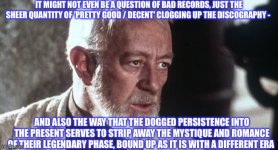one of the things that got me thinking on this topic is that I remembered interviewing a guy who specialized in organising the reformation of bands and doing it in a classy way that burnished the legend
he used the Buzzcocks as his negative example of reformation - where the group just "runs the brand into the ground"
they did the original classic 3 albums + near-flawless run of a dozen singles or something like that (compiled - ace A-sides on one side, ace 'n' weird B-sides on the other - as Singles Going Steady). split, did unsuccessful offshoots and solo careers. and then when it became clear that this wasn't panning out, they reformed - did a bunch more albums in the classic Buzzcocks style but not as good, "classic" but not actually classic - toured and gigged endlessly, like a punk version of the Tremeloes or something
for this bloke, this was the exact opposite of how he thought an iconic group should curate its legacy
seemingly the Buzzcocks are carrying on even after Pete Shelley's death - i think they did some mega-concert at Albert Hall not so long ago
in the case for the defence - with Shelley still in them, they could do a terrific concert even as late 2012 (i caught them at a festival, never having seen them originally). but I can't imagine this vestigial version can be much cop
but again, i suppose, what are Diggle & Co supposed to do? they too have a stake in the legend, they don't want to sit on their arses, they like the affirmation



